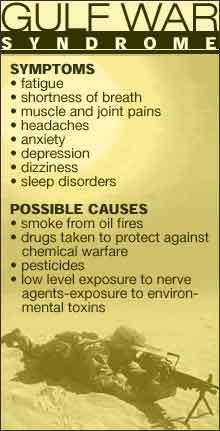 Jury out on Gulf war syndrome and Iraq vets
Jury out on Gulf war syndrome and Iraq vets
By Pat Hammond
Early assessments of the health of Iraq War veterans have led a local specialist on Gulf War illness to conclude that servicemen in Iraq are not contracting the illness that struck thousands of service personnel in the Persian Gulf War. But some medical experts say the optimistic outlook may be premature.
The approximately 50 Iraq veterans seen by Dr. Victor Gordan at the Veterans Administration Hospital here display the injuries you would expect from a war trauma to the backs, knees, shoulders. Several showed signs of post traumatic stress disorder (PTSD) but none, he said, presented any of the weird illnesses we saw from the Gulf War such as…”
They went through broadside bombing, ambushes, suicide bombing. Two or three were shot at, Gordan said. They were not too interested in seeing a doctor.
This lack of Gulf War illness type symptoms, to me, is proof that the Gulf War illness was induced by environmental hazards, said Gordan, who has treated more than 800 patients who returned from the 1991 Gulf War with unexplained symptoms and still treats many of them.
Gordan said the lack of symptoms of Gulf War illness supports what he has believed all along: that the illness predominant in veterans of that was generated by environmental hazards such as burning oilfields, gaseous substances emanating from exploded Scud missiles, and exposure to nerve agents and other weapons of chemical warfare.
But Lt. Col. (Dr.) Stephen Phillips, an Army doctor who was in the Gulf War and now serves at the Pentagon, told the Sunday News he thought it was too early to deduce that there will be no incidence of Gulf War Illness in the war in Iraq.
The 50 men and women from the Iraq War visited Gordan because they were seeking war-related disability benefits, not to be treated for them, Gordan said. While they were there he encouraged them to register in the Persian Gulf Operation Iraqi Freedom Registry, he said.
Registration is not required, but Gordan said it’s the smart thing to do. If at a later time one of the veterans discovers he may have developed other wartime injuries such as the collection of symptoms known as Gulf War illness, he would already be in the system.
The register was originally set up for Vietnam veterans, particularly those who sustained health disorders as a consequence of exposure to Agent Orange, and has continued through all subsequent wars. The statistics are computerized in Austin, Texas, and made available to Congress, Gordan said.
It’s the best system for finding out the status of the veterans when they come back from war, Gordan said. I have found it unbelievably helpful. We, in the VA system, can’t force them to sign in but we are urging everybody to sign whether they have health problems or not, because a war experience could have a delayed effect, even up to 10 or 15 years.
In the Gulf War, Gordan said, I was overwhelmed by the numbers of veterans seeking medical help. They wanted to see a doctor about those painful symptoms. They didn’t know what was going on. Now there is a high no-show. My interpretation has to be they (the Iraq war veterans) feel healthy, so they think, Why should I bother to see a doctor?’
Lt. Col. Phillips was deployed to the Gulf War in the early 1990s to provide medical services to the troops. And so I had a vested interest in a lot of the post-war activities, he said.
Phillips said 1995 was his busiest year working with people with Gulf War illnesses. That’s four years after their exposure, he said.
That’s why, Phillips said, while I am pleased to hear of Dr. Gordan’s personal experience, it may be a little early to tell. The whole phenomenon of unexplained illness in Gulf War veterans took a few years to peak and get a little attention.
Responding to Phillips’ observation, Gordan said the first indications of Gulf War illness took place in September 1991; the war began in January of that year. It only took a few months, Gordan said.
My experience is that those things started showing several months after the beginning of the Gulf War, Gordan said. We will keep an eye on these guys (Iraq war veterans), have them enroll in the registry, and see what happens.
From a medical perspective, Phillips said, it is likely we will have soldiers returning who will have unexplained physical symptoms. Following most of the major conflicts in the United States there was a subset of men whose illnesses did not fit the model.
I personally believe, Phillips said, we are going to see some who have unexplained symptoms, but we are doing different things with the returning members and I think we will be way ahead of the Gulf War experience.
The Department of Defense used the Gulf War health experience to develop protective clothing and devices to protect against potential environmental hazards and to set up a pre- and post-deployment data system on each soldier’s health and provided each unit with a health officer, among other things.

ATTENTION READERS
We See The World From All Sides and Want YOU To Be Fully InformedIn fact, intentional disinformation is a disgraceful scourge in media today. So to assuage any possible errant incorrect information posted herein, we strongly encourage you to seek corroboration from other non-VT sources before forming an educated opinion.
About VT - Policies & Disclosures - Comment Policy



